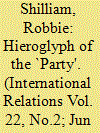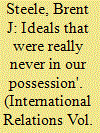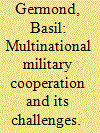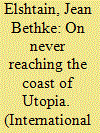| Srl | Item |
| 1 |
ID:
082745


|
|
|
|
|
| Publication |
2008.
|
| Summary/Abstract |
Questions about the agency of the Communist Party - especially its failure to effect and support radical social transformations - formed one crucial aspect of the socio-political context in which the agent-structure debate was rejoined by social scientists in the 1960s and 70s. Moreover, the Party had long existed as a hieroglyph for Marxist thought. And deciphering the historical importance of the Party in processes of world development required the theorisation of an inter-societal dimension to the agent-structure problem. I contend that using an Ideas in Context approach to the agent-structure debate in order to consider this pre-existing Marxist literature on the agency of the Party illuminates issues obscured in the progress of the debate in IR. To this effect I examine the seminal writings of Trotsky, C. L. R. James and Althusser in order to reveal how the debate, imported into IR in the late 1980s, was already framed by the problem of analytically and ethically coming to terms with the inter-societal dimension of socio-political transformation, especially when this dimension pushed to the fore the generative nature of inter-societal alterity manifested in the condition of - and `advantage' of - comparative backwardness. Crucially, the attempts made to decipher the hieroglyph of the Party are instructive in that they reveal foundational challenges for the intellectual production of knowledge of inter-societal alterity and its centrality to issues of continuity and change, the identification of structural constraints and sources of transformative agency
|
|
|
|
|
|
|
|
|
|
|
|
|
|
|
|
| 2 |
ID:
082747


|
|
|
|
|
| Publication |
2008.
|
| Summary/Abstract |
This article addresses how the recent US treatment of suspects detained in its War on Terror relates to the issues of US self-identity and US honor. Both the abuse of these individuals, and the shock which such abuse engenders (when revealed to the US public), are manifested by punishment drives that reinforce a nation's sense of internal honor, which is constructed and connected to a nation's self-identity. While professing commitments to human rights, on the one hand, and interrogation and torture, on the other, are contradictory practices - they are similar in the sense that both are forms of discipline which uphold internally constituted ontological visions of the US Self. Drawing upon a Foucauldian view of ethics, `the relation to oneself', the article avers that precisely because these disciplinary mechanisms are driven by self-identity and protecting the `honor' of the US nation-state, domestic and international actors can use two tactics - `reflexive discourse' and self-interrogative imaging - to stimulate US agents to reform such practices in the future
|
|
|
|
|
|
|
|
|
|
|
|
|
|
|
|
| 3 |
ID:
082744


|
|
|
|
|
| Publication |
2008.
|
| Summary/Abstract |
In order to cope with current security challenges, such as regional conflicts, humanitarian disasters or terrorist threats, European states in the post-Cold War era make important use of naval forces within a complex multilateral framework. However, the issues relating to European navies have rarely been tackled in the literature on multilateral military cooperation. Therefore this article aims to fill the gap by studying the nature of the European post-Cold War multilateral naval framework, and taking it as a case study to illustrate the current issues facing multinational military cooperation. To do so, the article focuses on the wider Mediterranean region, since most of the security challenges identified by the Europeans are now localized in this area
|
|
|
|
|
|
|
|
|
|
|
|
|
|
|
|
| 4 |
ID:
082743


|
|
|
|
|
| Publication |
2008.
|
| Summary/Abstract |
Elshtain argues that the realist-idealist divide serves no useful heuristic or even polemical purpose. Beginning with Tom Stoppard's acclaimed trilogy, The Coast of Utopia, Elshtain unpacks utopian arguments of recent vintage, showing their distinctive features. She goes on to display the utopistic/idealist `moments' in the work of self-described `realist' E. H. Carr as part of a critical re-examination of Carr's work. The article continues with an appreciative assessment of Martin Wight, concluding that his `idealism' is far more `realistic' than are the arguments of many `realists'. The article's concluding section makes the case for Augustinian realism
|
|
|
|
|
|
|
|
|
|
|
|
|
|
|
|
| 5 |
ID:
082746


|
|
|
|
|
| Publication |
2008.
|
| Summary/Abstract |
This study seeks to identify the factors that determine advisers' choice of tools and assess their influence under different circumstances. It uses historical process tracing methods to examine the `battle' between President Truman's foreign policy advisers over the formulation of US policy towards the Palestine question. It finds that: (1) advisers' self-perception determines the degree of their flexibility in the choice of tools; (2) the distribution of formal powers, the personalities involved and the type of policy question determine the intensity of the advisory battle; (3) non-expert advisers can win the advisory battle by using psychological tools of persuasion but only under certain specific conditions, which existed in this case; and finally that (4) an adviser's influence will be limited by the extent to which the leader is willing and able to independently form an opinion on the policy question
|
|
|
|
|
|
|
|
|
|
|
|
|
|
|
|